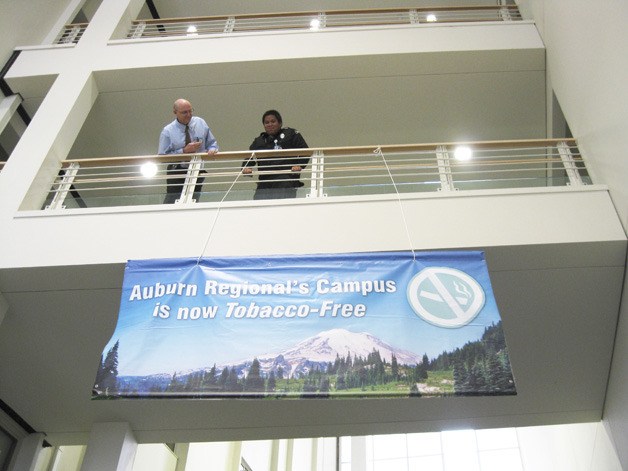When a new anti-smoking law went into effect in Washington state six years ago, it drew an imaginary line.
Smoking was banned in all public places and work areas, requiring people who light up to stay at least 25 feet away from doors, windows and vents leading to such spaces.
Officially titled the Smoking in Public Places Act, the law – at the time – was the most restrictive yet to be adopted by any state in the nation.
Now, more and more businesses, schools, parks and other public places have gotten into the act by taking a bigger step in the war on tobacco use. Larger smoke-free zones have sprouted, in Auburn and elsewhere, imposing stronger, territorial opposition to tobacco use.
Auburn Regional Medical Center officially joined the cleaner-air movement last Thursday, appropriately on the 36th anniversary of the Great American SmokeOut.
“As an organization dedicated to health care, making our campus a tobacco-free environment is the right thing to do,” said Larry Coomes, CEO of Auburn Regional, who symbolically marked the occasion by breaking a three-foot-long mock cigarette over his knee (inset photo) as officials unfurled a large no-smoking banner from the atrium skybridge.
“This reduces exposure to smoke for our patients, visitors and staff as they enter and leave the hospital, and will improve the health of our staff and community,” Coomes explained. “It will also assist us in our efforts to keep our campus clean.”

Fittingly, the health care community is a model facilitator in the no-butts Occupy movement.
Throughout the state and nation, more hospitals, clinics, nursing homes and rehabilitation centers are going permanently and completely tobacco-free. More regional and national hospitals have adopted comprehensive smoke-free policies on their campuses.
At Auburn Regional, tobacco use is off limits on a growing campus that includes parking lots, garages and walkways.
Hospitals are not alone.
The City of Burien declared its parks, beaches, playgrounds and ballfields tobacco- and smoke-free zones last week, joining Auburn and other nearby cities with similar policies.
Auburn’s public schools actually began the push many years ago, putting an anti-smoking policy in motion and applying it to its many campuses.
“I thought it was a growing movement 20 years ago,” said Linda Cowan, former Auburn School District superintendent who helped usher in the policy. “For agencies, there are more challenges today … but it’s the right thing to do.”
Cowan stays active and influential as chairperson on the ARMC’s Board of Governors. Last week’s smoke-free declaration party at the hospital further supports the woman’s passionate efforts to create and promote a healthier Auburn, “because,” as she put it, “we love our kids, we love our employees, we love our community, and we need to be doing our part … to support a tobacco-free environment.”
Other schools, big and small, have taken action.
The University of Washington and Washington State University have policies prohibiting smoking in campus residential buildings. Clark College became the first college in the state to adopt an entirely smoke-free policy six years ago.
The University of Oregon campus officially went tobacco-free this fall, offering students, faculty and staff smoking cessation assistance during the transition.
As more entities join the movement, the City of Auburn has entered a new phase in its commitment to the cause. Supported by a federally-funded grant – Communities Putting Prevention to Work – officials are further addressing ways to fight obesity and tobacco use, two of the leading causes of death in King County.
Parks are off limits. Other public spots may be next.
And a majority of people want the change.
In a recent survey of King County residents, 70 percent said they support smoke-free public places, including parks.
To get there, teamwork is needed.
The ARMC, for instance, has hooked up with the Auburn Valley Y – through a generous grant from the Muckleshoot Tribe – to provide free weekly support groups and workshops to help the public kick the habit. That two-year partnership continues to make an impact.
The tobacco-free movement promises to grow.
“It feels like everyone is getting it,” said Heidi Henson, Auburn Valley Y program coordinator who has been instrumental in the local tobacco-cessation network. “Businesses are understanding that it’s so expensive to actually have an employee who is a tobacco user. … More and more businesses are coming onboard.
“It’s that pebble in the pond, and everybody is getting touched by it and they’re getting it.”
=====
FREE HELP
Auburn Regional Medical Center hosts a no-cost weekly Living Tobacco-Free support group in partnership with the Auburn Valley Y.
For more information on the support group, contact group leader Heidi Henson at 253-223-7538 or hhenson@seattleymca.org.

